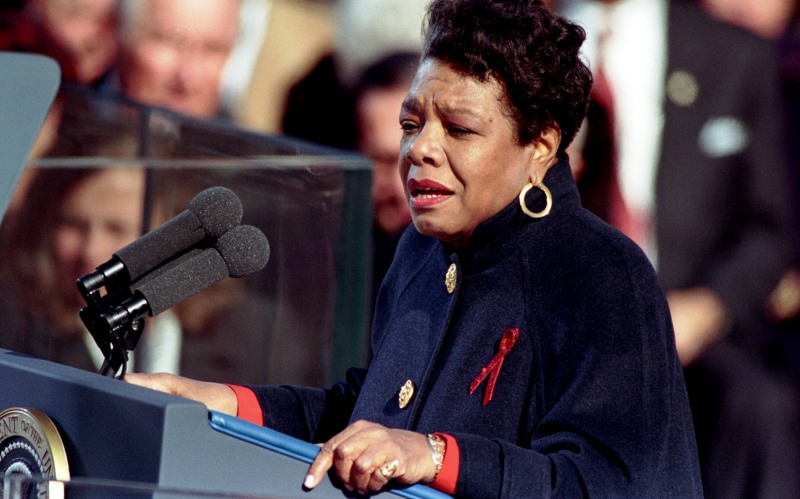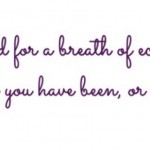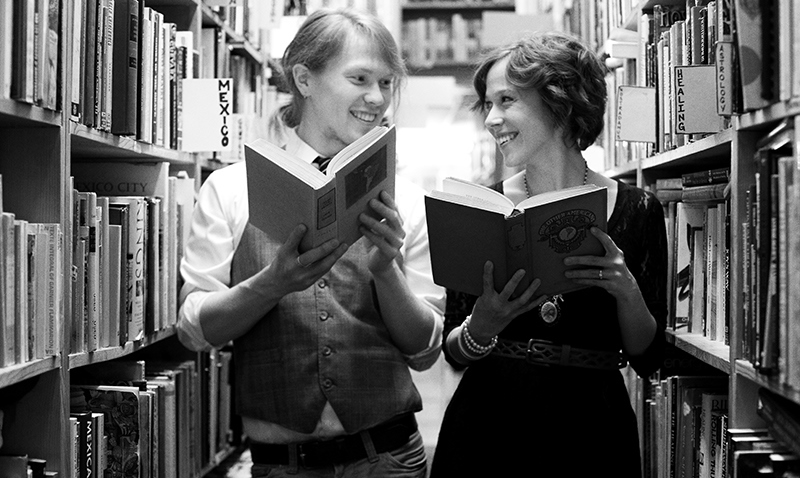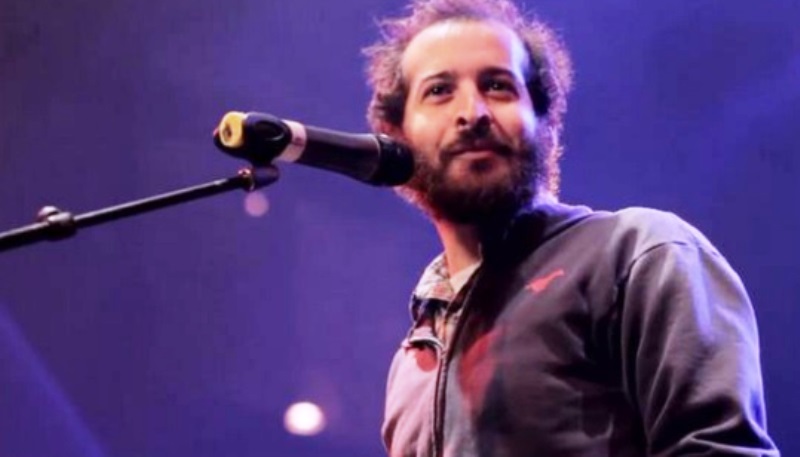Maya Angelou (born Marguerite Annie Johnson) was an African American poet and prose writer. She has also written seven autobiographies. In her poems, Angelou explored themes like love, loss, issues of women, music, racism, struggle, and discrimination.

Image source: Google, copyright-free image under Creative Commons License
Popularly called “the people’s poet”, Angelou’s poetry is phenomenal and it will inspire you to rise.
Suggested read: Spoken Word Poems By Women That Will Lead You To Yourself
The complete collected poems of Maya Angelou
Here are our favorite 5 works from the complete collected poems of Maya Angelou that we think you will enjoy reading just as much as we did compiling.
1. Still I Rise
You may write me down in history
With your bitter, twisted lies,
You may trod me in the very dirt
But still, like dust, I’ll rise.
Does my sassiness upset you?
Why are you beset with gloom?
’Cause I walk like I’ve got oil wells
Pumping in my living room.
Just like moons and like suns,
With the certainty of tides,
Just like hopes springing high,
Still I’ll rise.
Did you want to see me broken?
Bowed head and lowered eyes?
Shoulders falling down like teardrops,
Weakened by my soulful cries?
Does my haughtiness offend you?
Don’t you take it awful hard
’Cause I laugh like I’ve got gold mines
Diggin’ in my own backyard.
You may shoot me with your words,
You may cut me with your eyes,
You may kill me with your hatefulness,
But still, like air, I’ll rise.
Does my sexiness upset you?
Does it come as a surprise
That I dance like I’ve got diamonds
At the meeting of my thighs?
Out of the huts of history’s shame
I rise
Up from a past that’s rooted in pain
I rise
I’m a black ocean, leaping and wide,
Welling and swelling I bear in the tide.
Leaving behind nights of terror and fear
I rise
Into a daybreak that’s wondrously clear
I rise
Bringing the gifts that my ancestors gave,
I am the dream and the hope of the slave.
I rise
I rise
I rise.
Published in 1978, this poem has been called a, “proud, even defiant statement on behalf of all Black people”. It draws attention to ways in which oppression operates like writing some people down in history that Angelou speaks about in the first stanza of this poem. The poem also fills one with hope of a triumph despite the adversity and discrimination, which is want makes it such a marvelous piece. The poem was so influential that in 1994, none other than Nelson Mandela recited Still I Rise at his presidential inauguration.
2. Phenomenal Woman
Pretty women wonder where my secret lies.
I’m not cute or built to suit a fashion model’s size
But when I start to tell them,
They think I’m telling lies.
I say,
It’s in the reach of my arms,
The span of my hips,
The stride of my step,
The curl of my lips.
I’m a woman
Phenomenally.
Phenomenal woman,
That’s me.
I walk into a room
Just as cool as you please,
And to a man,
The fellows stand or
Fall down on their knees.
Then they swarm around me,
A hive of honey bees.
I say,
It’s the fire in my eyes,
And the flash of my teeth,
The swing in my waist,
And the joy in my feet.
I’m a woman
Phenomenally.
Phenomenal woman,
That’s me.
Men themselves have wondered
What they see in me.
They try so much
But they can’t touch
My inner mystery.
When I try to show them,
They say they still can’t see.
I say,
It’s in the arch of my back,
The sun of my smile,
The ride of my breasts,
The grace of my style.
I’m a woman
Phenomenally.
Phenomenal woman,
That’s me.
Now you understand
Just why my head’s not bowed.
I don’t shout or jump about
Or have to talk real loud.
When you see me passing,
It ought to make you proud.
I say,
It’s in the click of my heels,
The bend of my hair,
the palm of my hand,
The need for my care.
’Cause I’m a woman
Phenomenally.
Phenomenal woman,
That’s me.
It is not possible to have a list of Maya Angelou’s most stunning poems and not include Phenomenal Woman. This poem talks of how the narrator does not bother to adhere to what society considers phenomenal in a woman, and yet, she talks about all the qualities in her that make her phenomenal nonetheless. This poem featured in Poetic Justice, a 1993 American film.
My favorite line would definitely be:
They try so much
But they can’t touch
My inner mystery.
Suggested read: Today’s Book on #50BooksInAYear: Collected Love Poems By E.E. Cummings
3. On the Pulse of Morning
A Rock, A River, A Tree
Hosts to species long since departed,
Marked the mastodon,
The dinosaur, who left dried tokens
Of their sojourn here
On our planet floor,
Any broad alarm of their hastening doom
Is lost in the gloom of dust and ages.
But today, the Rock cries out to us, clearly, forcefully,
Come, you may stand upon my
Back and face your distant destiny,
But seek no haven in my shadow,
I will give you no hiding place down here.
You, created only a little lower than
The angels, have crouched too long in
The bruising darkness
Have lain too long
Facedown in ignorance,
Your mouths spilling words
Armed for slaughter.
The Rock cries out to us today,
You may stand upon me,
But do not hide your face.
[…]
This poem was published in 1993, and Angelou recited it at the inauguration of President Bill Clinton on the 20th of January, 1993. She was the second ever poet to be honored this way. Before her, Robert Frost had recited “The Gift Outright” at President John F. Kennedy’s inauguration.
In 1994, Angelou’s audio recording of the poem won the 1994 Grammy Award.
4. Caged Bird
A free bird leaps
on the back of the wind
and floats downstream
till the current ends
and dips his wing
in the orange sun rays
and dares to claim the sky.
But a bird that stalks
down his narrow cage
can seldom see through
his bars of rage
his wings are clipped and
his feet are tied
so he opens his throat to sing.
The caged bird sings
with a fearful trill
of things unknown
but longed for still
and his tune is heard
on the distant hill
for the caged bird
sings of freedom.
The free bird thinks of another breeze
and the trade winds soft through the sighing trees
and the fat worms waiting on a dawn bright lawn
and he names the sky his own
But a caged bird stands on the grave of dreams
his shadow shouts on a nightmare scream
his wings are clipped and his feet are tied
so he opens his throat to sing.
The caged bird sings
with a fearful trill
of things unknown
but longed for still
and his tune is heard
on the distant hill
for the caged bird
sings of freedom.
Maya Angelou’s first autobiography, “I Know Why The Caged Bird Sings”, gets its name from a line in Paul Lawrence’s poem, Sympathy. This poem is inspired by Sympathy, and uses the imagery of a caged bird to talk about discrimination toward African Americans. For those of you who don’t know Paul Lawrence Dunbar, he was an African American poet too.
Caged Bird is different from Sympathy in that it also talks about the difference between the whites and the blacks by using the imagery of a caged bird and a free bird.
5. Africa
Thus she had lain
sugercane sweet
deserts her hair
golden her feet
mountains her breasts
two Niles her tears.
Thus she has lain
Black through the years.
Over the white seas
rime white and cold
brigands ungentled
icicle bold
took her young daughters
sold her strong sons
churched her with Jesus
bled her with guns.
Thus she has lain.
Now she is rising
remember her pain
remember the losses
her screams loud and vain
remember her riches
her history slain
now she is striding
although she has lain.
The last poem on this list, Africa, speaks of the continent’s history. It speaks of how Africa wa plundered by European imperialist for its resources and its people being taken as slaves.
In the first stanza, Angelou compares Africa to a woman. In the second, she says that white invaders “took her young daughters, “sold her strong sons” and “bled her with guns”.
Like all her poems, she ends the poem on a note filled with hope when she says,
her history slain
now she is striding
although she has lain.
Suggested read: The King Of Romantic Poetry, P.B. Shelley, And His Creations
That is all we have on today’s post on the complete collected poems of Maya Angelou. Did you like what you just read? Let us know in the comment section below.
Keep your eyes on this space if you love books and tales they carry in them. If you want to contribute an article, then please feel free to do so.
See you again next time.
Featured image source: Google, copyright-free image under Creative Commons License













